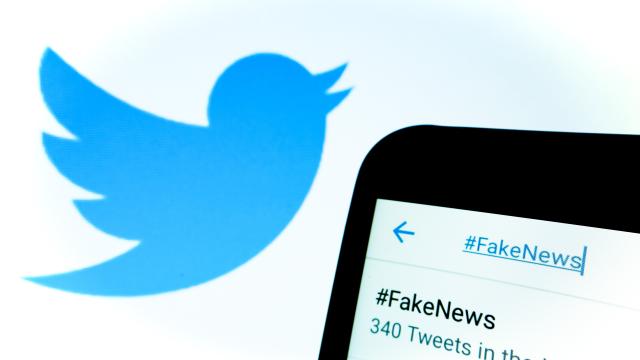Twitter announced it’s going to do more to combat misinformation on its platform. On Thursday we learned the social media giant will be slapping a “fake news” sticker on misleading tweets from official accounts spouting off about a major crisis or war. Though the offending tweets will remain online, they will be hidden behind a Wizard of Oz-like screen (“pay no attention to the fake news behind the curtain”), and the promotion of those tweets will be further hindered in Twitter’s algorithms.
In a blog post, Twitter’s Head of Safety & Integrity Yoel Roth said the platform is creating a new crisis misinformation policy that seeks to push back against misinformation around events like the ongoing war in Ukraine.
The site will start adding warning notices to tweets that include false news coverage of a disaster or conflict, including fake allegations of “use of force” like the use of banned munitions, “demonstrably false” allegations of atrocities, and misinformation regarding international sanctions, defensive actions, or humanitarian missions.
The list seems perfectly geared toward official Russian accounts, which have become a hive for misconstrued or even outright false information about the war in Ukraine that has caused untold carnage for nearly three months.
Any tweet that breaks these policies will be hidden behind a warning notice that reads “This Tweet violated the Twitter rules on sharing false or misleading info.” The message remains accessible “for accountability purposes” but users will need to click through the warning notice before they can see the content. In addition, people will no longer be able to retweet or promote the content.
The new policy takes aim at “high profile accounts” that include state-affiliated media and official government accounts. Accounts that regularly violate the policy could potentially be limited in what other users can retweet and will be ineligible for being shown in top search results. Two notices of violations could result in a 12-hour ban, where three or more in 30 days will result in a week-long ban
All of that seems specifically targeted toward recent campaigns mostly on the side of Russia to gaslight the world about their invasion of Ukraine. Russia’s official disinformation apparatus has long been sophisticated and effective, even prior to its invasion of Ukraine. Gizmodo has previously reported about official Russian embassy twitter accounts regularly violating Twitter’s misinformation policies and terms of service. Other Russian-leaning accounts have spread fake videos blaming civilian deaths on Ukraine’s military, and that’s just a glimpse of the tip of the iceberg for how the country has tried to confuse the world as to what’s happening in its invasion.
Roth said Twitter has been developing this framework since last year, citing situations that would necessitate response as anything that threatens life, health, or basic subsistence. It could potentially be applied to events like natural disasters, mass shootings, and more.
This new policy comes down the pike despite Elon Musk’s near-religious proclamations of “free speech” above all else. Musk has said he would bring back banned accounts for people like former President Donald Trump. Even though he’s publicly against perma-bans, he has only offered vague ideas of what content would be liable for moderation. Tweets that are “illegal or otherwise just destructive to the world” or simply “wrong or bad” could result in temporary bans or removed tweets, according to the world’s richest billionaire.
Though the question remains whether the deal will actually go through. Musk proclaimed the planned buyout of the platform was “on hold” last week for what he claimed were inconsistent figures of the number of bots on Twitter. In a statement to The New York Times, Twitter’s board is putting up its dukes, saying “We intend to close the transaction and enforce the merger agreement.”
While the notice states this rule applies to emergency situations only, misinformation not dealing with the current bloodshed in Ukraine is still rampant on Twitter. A recent report from environmental groups put Twitter dead last for how well it was handling climate change disinformation.
